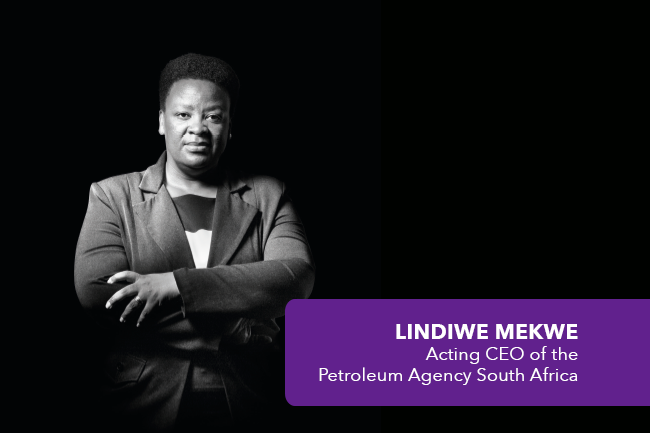Four years ago, stakeholders in the oil and gas (O&G) industry were concerned. South Africa just didn’t have enough proven O&G reserves to enable and promote its plans to diversify the country’s energy mix, leaving it heavily dependent on declining coal resources and costs associated with coal-produced electricity, and imports of crude oil that, in being pegged to the dollar, were – and remain – financially crippling to society.
In February this year that scenario changed dramatically with the discovery by French oil major, Total, of Brulpadda, a field of primarily gas condensate some 175 km off the southern coastline in the Outeniqua basin. Estimated at up to 1 billion barrels, it may be sufficient to supply South Africa’s refineries for around four years, and is considered a catalytic find.
Among those whose optimism is heightened is Lindiwe Mekwe, acting CEO of the Petroleum Agency South Africa. ‘This discovery will certainly spur interest in deepwater exploration, and there is renewed optimism about the potential of other such discoveries. At this point we have no idea exactly what’s out there, with only a few open exploration acreages ongoing.’
Mekwe is referring to a moratorium on O&G exploration that was imposed in June 2018 by Mineral Resources Minister Gwede Mantashe, allowing only exploration and production applications that were currently in the system to be processed. This is where the agency stepped in, given its mandate to promote the prospectivity of the country for O&G and as a potential gateway and hub for the industry service companies that operate throughout the continent.
As a part solution, the agency, through contractual agreements, introduced a clause that allows licence holders to conduct and explore options for gas markets before making a final investment decision into developing a field. ‘This clause has been used by a number of companies that are looking into establishing the most viable markets for their produced gas,’ according to Mekwe. And South Africa is certainly one of the most needful markets. Currently some 60% of crude oil needs are met by imports from the Middle East and Africa. There’s a message behind this statistic, explains Mekwe.
‘The implication is that there is room for growth and space for domestically produced crude oil. In terms of gas, the nation also has fairly low local production so we’ve become somewhat dependent on what we can import from Mozambique. While the gas market is not as appealing as that for crude oil, any large gas resources would really open up local markets for electricity generation or the production of various refined petroleum products,’ she says. ‘Where we really see this working impactfully is in South Africa’s already proven mid- to downstream value chain, which contributes billions of rands in taxes and royalties, through activities inclusive of refineries, storage, distribution and retailing stations, the latter estimated to be in excess of 4 500.’
There have been a few hindrances to progressing South Africa’s upstream value chain, not least of which is infrastructure (particularly that of piping), but there is also much uncertainty around legislation. ‘Prolonged debates around legislative frameworks have included the MPRDA [Mineral and Petroleum Resources Development Act] Amendment Bill and onshore technical regulations. However, we have assurances from the minister that we can expect new O&G legislation to be released later in the year,’ says Mekwe. ‘Despite these challenges, some companies have continued to invest significantly into the exploration and production of local O&G.’
Notwithstanding the discovery by Total, there is some concern that although there is risk appetite to explore South Africa’s acreage, as the oil major demonstrated, it may decrease based on the de-risked opportunities that exist elsewhere, such as Mozambique. However, should companies leave South African shores to pursue other African countries that are known to have significant discoveries, all is not lost. ‘The finds of O&G in neighbouring countries may offer us some form of security in terms of future energy demands, since there is opportunity for regional importation, which takes away our dependency from the Middle East and West Africa,’ says Mekwe.
The relationships the agency explores with close neighbours, such as Mozambique, and the region as a whole, are sound and practical, and it welcomes collaborative relationships with regional O&G players. Mekwe says this has the aim of advancing, among other imperatives, regional co-operation. ‘The agency has intensified its activities in the region in pursuit of interconnectiveness, and particularly co-operation in minimising the impact of the oil and gas sector.
‘In the past we have supported the Namibian governmental oil and gas company, Namco, with data management and data storage services. We have played a role in the Benguela Current Commission, which is a multi-sectoral inter-governmental initiative between South Africa, Angola and Namibia. This commission is tasked with promoting the sustainable management of the Benguela Current Large Marine Ecosystem.
‘Overall the southern region stands to benefit no matter where O&G is found, and delivered,’ says Mekwe. ‘All we want is to ensure prosperity for all within the regulatory framework, and that sustainable best practices are applied.’



